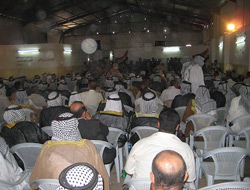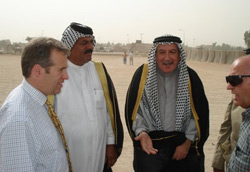USIP's Iraq program aims to reduce interethnic and interreligious violence, speed up stabilization and democratization, and reduce the need for a U.S. presence in Iraq. As part of this program, USIP has maintained a small office in the Green Zone in Baghdad since early 2004. Rusty Barber, a former political officer in the Foreign Service, has run the office since March 2007. His regular dispatches offer a lively and sobering insider's view of the promise and peril facing U.S. efforts in that country. We'll update this section each week, making only minimal changes for security reasons.
Last week's highlight was most certainly the gathering of tribal sheiks in Mahmoudiyah, the heart of the so-called "Sunni Triangle" south of Baghdad. The purpose of the gathering was to create a tribal council similar to the much-ballyhooed Salvation Council that was formed among Sunni tribes in al-Anbar to challenge al-Qaeda. USIP was asked to attend by the Mahmoudiyah Qaddah Council and tribal leaders who participated in the Amman trip last month.
The route south is the same one along which thousands of Shia faithful march to the holy shrines in Karbala during Ashura and other religious festivals. From my cramped seat behind the humvee driver, I gazed out the window while trying to avoid being kicked by the gunner as he swiveled around on a swing above, training his .50 caliber in an arc. The view was perhaps the grimmest I have ever seen. A flattened, treeless moonscape of dilapidated structures whose purpose as home, business, storage or all three was impossible to tell. Plots vacant of anything discernable except trash. The stench of sewage would occasionally waft through the vents of the truck. On the sides were small vendors selling sundries and—most frequently—gasoline in large water bottles. Occasional flocks of sheep baked in the heat along with their minders. I tried to imagine myself surviving in such a place, and could not.
Image on right: Mahmoudiyah Tribal Support Council.
 Arriving at the dusty Iraqi army base, I was greeted by General Ali Jasim Mohammed, commander of the 6th Brigade responsible for south Baghdad. General Ali had served as a member of the USIP-sponsored Tribal Reconciliation Outreach delegation to engage exiled Sunni sheiks in Jordan. He grumbled that the number of sheiks expected had somehow metastasized to the point where he wasn't at all sure they would fit into the barn he had made available. While waiting for the proceedings to start, I was given a briefing by Colonel Kershaw who walked me across the map of the district, explaining the distribution of the tribes, who was cooperating, who wasn't—peppering his talk with anecdotal tidbits of his encounters with the clans. After nearly two years, the Colonel knew his territory and its inhabitants well.
Arriving at the dusty Iraqi army base, I was greeted by General Ali Jasim Mohammed, commander of the 6th Brigade responsible for south Baghdad. General Ali had served as a member of the USIP-sponsored Tribal Reconciliation Outreach delegation to engage exiled Sunni sheiks in Jordan. He grumbled that the number of sheiks expected had somehow metastasized to the point where he wasn't at all sure they would fit into the barn he had made available. While waiting for the proceedings to start, I was given a briefing by Colonel Kershaw who walked me across the map of the district, explaining the distribution of the tribes, who was cooperating, who wasn't—peppering his talk with anecdotal tidbits of his encounters with the clans. After nearly two years, the Colonel knew his territory and its inhabitants well.
 Entering the "barn," I was impressed by the sea of keffiyed heads before me. Over 200 sheiks had heeded the call—Sunni and Shia—representing 80% of the 47 tribes and sub-tribes in the district. Sheik Sadoon, chief of the Kilaby tribe, and the only sheik dressed in a business suit, presided over the event. Colonel Kershaw and I were seated on the dais facing the audience, largely ignored, as one-by-one the chieftains stepped up to the podium. Most opened with a comment about the dramatic improvement their communities had experienced in the security situation, for which they universally praised the efforts of General Ali. More than one sheik, referring to the fact that they lived in what has been popularly termed the "Triangle of Death," asserted that today the moniker is neither accurate nor justified. They then proceeded to rail against the poverty, lack of services and absence of development projects in their communities, directing most of their ire at the Baghdad provincial governor, who had bravely come down for the event. The governor, sitting with us on the dais, responded by blaming the mayor and the Qaddah Council for these failures and concluded with a laundry list of things he and the central government were going to do for the sheiks. The latter had heard all this before and were clearly not in a buying mood. The governor then removed himself from the dais and sat in the front row, out of the direct line of sight and fire of the sheiks.
Entering the "barn," I was impressed by the sea of keffiyed heads before me. Over 200 sheiks had heeded the call—Sunni and Shia—representing 80% of the 47 tribes and sub-tribes in the district. Sheik Sadoon, chief of the Kilaby tribe, and the only sheik dressed in a business suit, presided over the event. Colonel Kershaw and I were seated on the dais facing the audience, largely ignored, as one-by-one the chieftains stepped up to the podium. Most opened with a comment about the dramatic improvement their communities had experienced in the security situation, for which they universally praised the efforts of General Ali. More than one sheik, referring to the fact that they lived in what has been popularly termed the "Triangle of Death," asserted that today the moniker is neither accurate nor justified. They then proceeded to rail against the poverty, lack of services and absence of development projects in their communities, directing most of their ire at the Baghdad provincial governor, who had bravely come down for the event. The governor, sitting with us on the dais, responded by blaming the mayor and the Qaddah Council for these failures and concluded with a laundry list of things he and the central government were going to do for the sheiks. The latter had heard all this before and were clearly not in a buying mood. The governor then removed himself from the dais and sat in the front row, out of the direct line of sight and fire of the sheiks.
A frail old mullah, well respected in the district, took the microphone and urged the congregation to realize their broader responsibilities to the people of their tribes and get back on the topic at hand: the formation of a tribal council. Much debate and random discussion then ensued on how to accomplish this. In the end, as he had in Amman, General Ali stepped in and suggested that five sheiks from each of the four principle nahiyas (mini-districts) be nominated along with ten from Mahmoudiyah city itself. This was dutifully accepted and we broke for lunch. Clearly, the military commander's political stock is high at the present time.
Lunch itself was quite an affair. Iraqi soldiers replaced the chairs with long, rickety tables in a flash, spreading them with plastic tablecloths and carrying in large plates of chicken, lamb and rice. The entire throng of Iraqi and American soldiers, sheiks, interpreters and I stood side-by-side and ate with our fingers from the same plates in traditional fashion. Several sheiks whom I have met in other events approached to say hello, one of which had participated in the recent SENSE training in Sulymaniyah.
Image on left: Rusty Barber, left, confers with Sheikh Fareeq Mubdir Al Ghereri of the Al Ghurair Tribe during the formation of the Mahmoudiyah Tribal Support Council.
 After lunch, I expected the meeting to reconvene to choose who would be on the tribal council. Instead, a group of about thirty sheiks gathered in a corner, and within ten minutes had selected the council members. The meeting was over. As we filed out, I ran into sheik Fareeq Mubdir Al Ghereri, another member of the Amman delegation and a fellow tribal chief. Mubdir complained bitterly that while the security improvements were dramatic, he was destitute and could not even afford seed for his now moribund agricultural fields. His colleague focused on the fact that a female bank clerk had recently demanded that he come in person to a local branch and provide documents in order to effect a simple financial transaction. It was the disrespect implied by having a woman make these demands that seem to bother him most.
After lunch, I expected the meeting to reconvene to choose who would be on the tribal council. Instead, a group of about thirty sheiks gathered in a corner, and within ten minutes had selected the council members. The meeting was over. As we filed out, I ran into sheik Fareeq Mubdir Al Ghereri, another member of the Amman delegation and a fellow tribal chief. Mubdir complained bitterly that while the security improvements were dramatic, he was destitute and could not even afford seed for his now moribund agricultural fields. His colleague focused on the fact that a female bank clerk had recently demanded that he come in person to a local branch and provide documents in order to effect a simple financial transaction. It was the disrespect implied by having a woman make these demands that seem to bother him most.
What rang loud and clear from this event is that for these tribal leaders, the loss of dignity that has led to the loss of their traditional authority in their communities is a condition they are desperate to correct. How that driving ambition will reconcile with local and government authority is the burning question that will now have a chance to play out.



